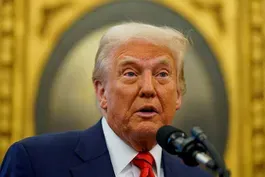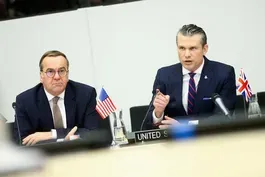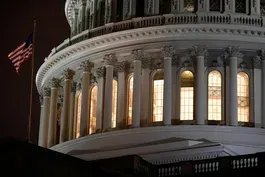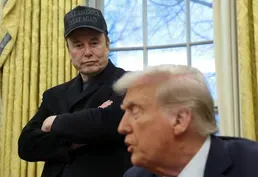
Trump's vision for dismantling the Department of Education
Clip: 2/12/2025 | 6m 11sVideo has Closed Captions
Trump's vision for dismantling the Department of Education
The Department of Education is on the Trump chopping block. Details have not been fully released yet, but the president has signaled plans to dismantle it and move some of its key functions elsewhere. The department oversees student loans, federal funds for lower-income students, special education programs and more. Geoff Bennett discussed more with Laura Meckler of The Washington Post.
Major corporate funding for the PBS News Hour is provided by BDO, BNSF, Consumer Cellular, American Cruise Lines, and Raymond James. Funding for the PBS NewsHour Weekend is provided by...

Trump's vision for dismantling the Department of Education
Clip: 2/12/2025 | 6m 11sVideo has Closed Captions
The Department of Education is on the Trump chopping block. Details have not been fully released yet, but the president has signaled plans to dismantle it and move some of its key functions elsewhere. The department oversees student loans, federal funds for lower-income students, special education programs and more. Geoff Bennett discussed more with Laura Meckler of The Washington Post.
How to Watch PBS News Hour
PBS News Hour is available to stream on pbs.org and the free PBS App, available on iPhone, Apple TV, Android TV, Android smartphones, Amazon Fire TV, Amazon Fire Tablet, Roku, Samsung Smart TV, and Vizio.
Providing Support for PBS.org
Learn Moreabout PBS online sponsorshipGEOFF BENNETT: The Department of Education is very much on the Trump chopping block.
Details have not fully been released yet, but President Trump has signaled plans to dismantle it and move some of its key functions elsewhere.
The Education Department oversees student loans, federal funds for lower-income students and special education programs, among many other things.
Already, the DOGE group and the administration have put a number of staff on leave and are stopping more than $900 million in contracts that allow for key education research on student and school performance.
For more, we're joined now by Laura Meckler, national education writer for The Washington Post.
Thanks for being here.
LAURA MECKLER, The Washington Post: Thanks for having me.
GEOFF BENNETT: So the $900 million worth of contracts that Elon Musk and his allies have canceled all but decimated the agency's research division, which is a big part of what the Department of Education does.
It gathers research and data.
What's the expected impact?
LAURA MECKLER: Well, a lot of this stuff is sort of low-key stuff that we don't really think about.
So, for instance, one of the things that this Institute for Education Sciences does is, they do sort of a census of all schools.
They gather information about, how many schools are there, how many kids are enrolled, what's the demographics of those students, what's the demographics of the teaching force?
This is information that we use for other federal programs.
It's information that other researchers rely on, that journalists rely on, that really forms the backbone of our understanding.
So that's an example of one of the contracts that was suddenly canceled out of the blue on Monday.
You also have work to evaluate programs, just try to understand better sort of what works and what doesn't, whether it be an early childhood program or a literacy program.
So it ranges from sort of big things like that to sort of niche programs.
Also, the U.S. participation in international assessments that, whenever you hear data like, well, the U.S. ranks X or Y against other countries in reading or math, that comes from studies and from testing that's done.
And there's a contract to do that testing.
That was cut.
GEOFF BENNETT: President Trump apparently said today that he wants the Department of Education to be closed immediately.
He has routinely criticized the department during the campaign.
And his criticism fits within sort of the larger, longstanding, conservative goal of rolling back the role of the federal government in education.
Most legal experts agree that no president can unilaterally shut down an established government department or agency, but that hasn't stopped them from trying to dismantle agencies that they don't like.
What programs, what sort of assistance for public school students would go away?
LAURA MECKLER: Well, there's really two separate questions.
One is, does the Department of Education exist?
And the other is, does the stuff that the Education Department does, does that exist?
So you could theoretically take the functions of the Department of Education and scatter them about the government.
So, one thing, important thing, that the Education Department does is, it enforces civil rights laws.
And that could be done by the Justice Department.
And it runs the federal student loan program, as you mentioned.
That could theoretically go to the Treasury Department.
Or you could decide, you know what?
We're not going to do this, that, or the other.
There's a big program called Title I that provides supplementary money for high-poverty schools.
Theoretically, you could decide not to do that, or you could cut it back, or you could just turn it into a block-grant to the states and let the states do whatever they want with the money.
So there's a lot of different ways that this could look.
GEOFF BENNETT: When President Trump and other Republicans talk about returning the control of education to the states, isn't that already the case, where states and local districts control local education?
I mean, the Department of Education doesn't have a national curriculum.
LAURA MECKLER: You know, every time I hear him say that, I just want to, like, put a little asterisk up for everybody to see and hear, because, yes, education is already controlled by the states and by local school boards.
States set broad rules that schools have to follow, and then the school districts implement them with the details, and they set the curriculum.
The Department of Education, the federal government, is not controlling education.
It is providing some supplemental work.
It is enforcing civil rights laws.
It has a big role in the federal student loan program for colleges.
But it is not -- we would not be returning education to the states.
That is where it is largely today.
GEOFF BENNETT: Linda McMahon is set to be the next secretary of education.
Her confirmation hearing is tomorrow.
Where does she fit within Mr. Trump's overall vision for rolling back this department?
LAURA MECKLER: Well, we should say that Linda McMahon is very close to President Trump.
She was co-chair of his transition committee.
She was his administrator for the Small Business Administration last time around, one of the people who came back for a second -- the second term.
So they're very close.
It was presumed that she will be ready willing and -- well, we will see if she's able to implement his vision.
But her own past is actually not particularly incendiary.
She has a very thin education record, but she does have an education record.
And the work that she did in Connecticut, the things that she said when she was running for Senate in Connecticut unsuccessfully twice were much more mainstream education ideas.
GEOFF BENNETT: Based on your reporting, what do educators think about all of this?
Because there was just that National Report Card that was released a couple of weeks ago, and it found that most fourth and eighth graders in 2024 still performed below pre-pandemic 2019 levels in both reading and math.
It suggests the status quo isn't working.
LAURA MECKLER: Right.
And that actually is the argument that you hear from conservatives for closing the Education Department.
They will say, lookit, we have these horrible test scores.
The things aren't getting better.
We have a crisis.
How has this helped?
It hasn't helped.
So let's try something new.
But other people look at it and say, no, it doesn't mean we need less support from the federal government.
It means we need more support.
So the things that we know work, such as high-dosage tutoring or extended time in schools, they say they need more support for those for those kind of efforts.
So, how you interpret those data, like so much here in D.C., it really depends on sort of what your point of view is.
GEOFF BENNETT: Laura Meckler with The Washington Post, thanks so much for coming in.
LAURA MECKLER: Thanks for having me.
Adrien Brody unpacks his performance in 'The Brutalist'
Video has Closed Captions
Adrien Brody unpacks his performance as a complicated man driven by art in 'The Brutalist' (8m 7s)
DOGE needs to be more transparent, former GAO head says
Video has Closed Captions
Musk's DOGE needs to be 'much more transparent' in spending cuts, former GAO head says (6m 35s)
Experts on what U.S. policy shifts on Ukraine mean for NATO
Video has Closed Captions
Experts examine what the U.S. policy shifts on Ukraine mean for NATO (8m 11s)
Hegseth tells NATO Ukraine membership unlikely
Video has Closed Captions
Hegseth tells NATO Ukraine membership unlikely as Trump says Putin will discuss ending war (4m 15s)
House Republicans reveal their budget blueprint
Video has Closed Captions
House Republicans reveal their budget blueprint (5m 22s)
Musk's influence grows as Trump hands him more power
Video has Closed Captions
Elon Musk's influence in the White House grows as Trump hands him more power (6m 19s)
News Wrap: U.S. frees Vinnik in Russian prisoner swap
Video has Closed Captions
News Wrap: U.S. frees cybercriminal Vinnik in Russian prisoner swap for Mark Fogel (6m 35s)
Providing Support for PBS.org
Learn Moreabout PBS online sponsorshipMajor corporate funding for the PBS News Hour is provided by BDO, BNSF, Consumer Cellular, American Cruise Lines, and Raymond James. Funding for the PBS NewsHour Weekend is provided by...



















